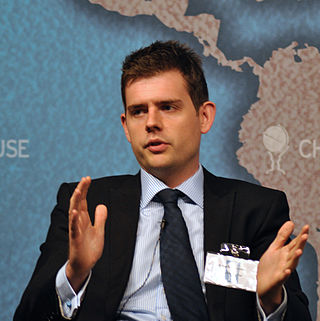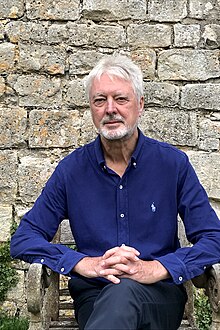
Fascism is a far-right, authoritarian, ultranationalist political ideology and movement, characterized by a dictatorial leader, centralized autocracy, militarism, forcible suppression of opposition, belief in a natural social hierarchy, subordination of individual interests for the perceived good of the nation and/or race, and strong regimentation of society and the economy.
Right-wing politics is the range of political ideologies that view certain social orders and hierarchies as inevitable, natural, normal, or desirable, typically supporting this position based on natural law, economics, authority, property, religion, biology or tradition. Hierarchy and inequality may be seen as natural results of traditional social differences or competition in market economies.
Populism is a range of political stances that emphasize the idea of "the people" and often juxtapose this group with "the elite". It is frequently associated with anti-establishment and anti-political sentiment. The term developed in the late 19th century and has been applied to various politicians, parties and movements since that time, often as a pejorative. Within political science and other social sciences, several different definitions of populism have been employed, with some scholars proposing that the term be rejected altogether.
Far-right politics, or right-wing extremism, is a spectrum of political thought that tends to be radically conservative, ultra-nationalist, and authoritarian, often also including nativist tendencies. The name derives from the left–right political spectrum, with the "far right" considered further from center than the standard political right.

Roger David Griffin is a British professor of modern history and political theorist at Oxford Brookes University, England. His principal interest is the socio-historical and ideological dynamics of fascism, as well as various forms of political or religious fanaticism.
The Nouvelle Droite, sometimes shortened to the initialism ND, is a far-right political movement which emerged in France during the late 1960s. The Nouvelle Droite is the origin of the wider European New Right (ENR). Various scholars of political science have argued that it is a form of fascism or neo-fascism, although the movement eschews these terms.

Right-wing populism, also called national populism and right-wing nationalism, is a political ideology that combines right-wing politics with populist rhetoric and themes. Its rhetoric employs anti-elitist sentiments, opposition to the Establishment, and speaking to or for the "common people". Recurring themes of right-wing populists include neo-nationalism, social conservatism, economic nationalism and fiscal conservatism. Frequently, they aim to defend a national culture, identity, and economy against perceived attacks by outsiders. Right-wing populism has remained the dominant political force in the Republican Party in the United States since the 2010s.

Cas Mudde is a Dutch political scientist who focuses on political extremism and populism in Europe and the United States. His research includes the areas of political parties, extremism, democracy, civil society and European politics. Mudde identifies himself as a political leftist.
Far-left politics, also known as the extreme left, are politics further to the left on the left–right political spectrum than the standard political left. The term does not have a single, coherent definition; some scholars consider it to be the left of communist parties, while others broaden it to include the left of social democracy. In certain instances—especially in the news media—far left has been associated with some forms of authoritarianism, anarchism, communism, and Marxism, or are characterized as groups that advocate for revolutionary socialism and related communist ideologies, or anti-capitalism and anti-globalization. Far-left terrorism consists of extremist, militant, or insurgent groups that attempt to realize their ideals through political violence rather than using democratic processes.

António Costa Pinto is a research professor at the Institute of Social Sciences, University of Lisbon, and Professor of Politics and Contemporary European History at ISCTE – Lisbon University Institute, Portugal.

Left-wing populism, also called social populism, is a political ideology that combines left-wing politics with populist rhetoric and themes. Its rhetoric often includes elements of anti-elitism, opposition to the Establishment, and speaking for the "common people". Recurring themes for left-wing populists include economic democracy, social justice, and scepticism of globalization. Socialist theory plays a lesser role than in traditional left-wing ideologies.

Matthew James Goodwin is a British academic who is professor of politics in the School of Politics and International Relations at the University of Kent. His publications include National Populism: The Revolt Against Liberal Democracy and Values, Voice and Virtue: The New British Politics.
In the politics of the United States, the radical right is a political preference that leans towards ultraconservatism, white nationalism, white supremacy, or other far-right ideologies in a hierarchical structure which is paired with conspiratorial rhetoric alongside traditionalist and reactionary aspirations. The term was first used by social scientists in the 1950s regarding small groups such as the John Birch Society in the United States, and since then it has been applied to similar groups worldwide. The term "radical" was applied to the groups because they sought to make fundamental changes within institutions and remove persons and institutions that threatened their values or economic interests from political life.
Centre-left politics is the range of left-wing political ideologies that lean closer to the political centre and broadly conform with progressivism. Ideologies of the centre-left include social democracy, social liberalism and green politics. Ideas commonly supported by the centre-left include welfare capitalism, social justice, liberal internationalism, and multiculturalism. Economically, the centre-left supports a mixed economy in a democratic capitalist system, often including economic interventionism, progressive taxation, and the right to unionize. Centre-left politics are contrasted with far-left politics that reject capitalism or advocate revolution.
Cumulative extremism is a form of political extremism that occurs when one form of political extremism mobilises against another form of political extremism, which was coined by British scholar Roger Eatwell. Eatwell defines cumulative extremism as: 'the way in which one form of extremism can feed off and magnify other forms'. Dr Mohammed Ilyas defines cumulative extremism as 'a process through which different forms of ‘extremism’ interact and can potentially produce a spiral of violence'. The academic Matthew Goodwin gives the example of far-right political organisations mobilising in response to the perceived threat of Islamic extremism.

The reverse post-material thesis or reverse post-materialism thesis is an academic theory used to explain support for far-right political parties and right-wing populist political parties. The thesis is modelled on the post-material thesis from sociology that has been used to explain the shift in Western societies from traditional economic interests towards issues such as environmentalism and feminism.
In political science, the terms radical right, reactionary right and populist right have been used to refer to the range of nationalist, right-wing to far-right parties that have grown in support since the late 1970s in Europe. Populist right groups have shared a number of causes, which typically include opposition to globalisation and immigration, criticism of multiculturalism, and opposition to the European Union, but do not oppose democracy.
Populism exists in Europe.
During the 1990s New Zealand saw a growth in populism, a political trend whose advocates claim to work for "the people" rather than for the "elite". The rise of populism in the country has been attributed to the introduction of the mixed-member proportional electoral system, as well as to the populist nature of election campaigns, such as that of the Labour Party in the lead-up to the 1999 election. The New Zealand First party, which has historically taken a nationalist standpoint, has been described as a populist party.
National Populism: The Revolt Against Liberal Democracy is a 2018 book by political scientists Roger Eatwell and Matthew Goodwin, published by Pelican Books.








